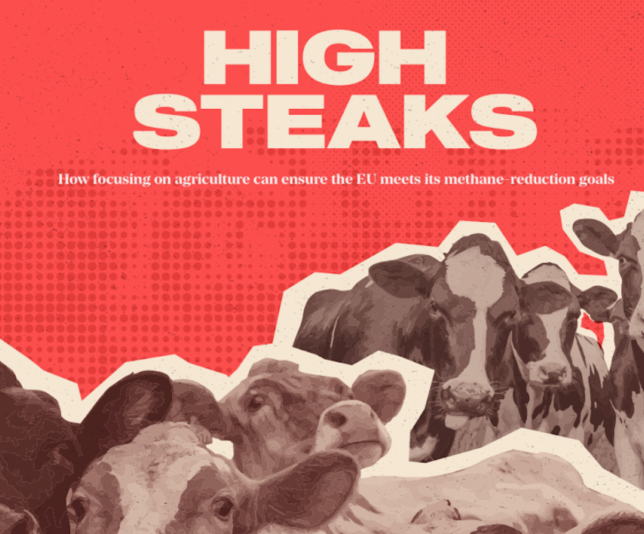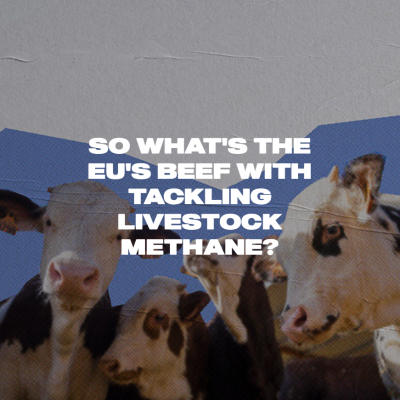The agricultural sector is the largest source of methane emissions in the EU, responsible for 53% of the block’s overall 15.2 megatonnes (Mt) of methane. To imagine what this means, converting this amount of methane into CO2 equivalent over 100 years translates into the total emissions of 50 coal-fired power plants. Yet, if we calculate methane over 20-year time frame, when it is assumed to be around 80-times more powerful than CO2, this becomes the equivalent emissions of over 160 coal power plants.
Due to significant impact this short-lived gas has on warming the atmosphere, the scientists have been saying that cutting methane is the most important thing we can do in this decade and it gives us the best chances to stay under 1.5 degree global heating. Livestock agriculture is the single biggest source of methane emissions, responsible for 32% of emissions globally. However, the Global Methane Pledge, which was launched at the UN Climate Summit in Glasgow last year, conveniently ignores the reductions that could come from reducing the consumption of meat and dairy.
For this reason, we have commissioned the independent consultancy CE Delft to investigate how much the EU – one of the instigators of the Global Methane Pledge - could reduce its methane emissions through different measures in agriculture, energy and waste sectors. The analysis shows that the EU’s policies at the beginning of the decade put it on track to cut emissions by 13.4% by 2030. Recent developments, particularly Methane regulation targeting the energy sector, could deliver further reductions of around 3.4% by 2030. But the study also shows that the EU is unlikely to deliver on its pledge to cut methane emissions by 30% by 2030 without cutting livestock numbers.

The EU can cut its methane emissions by up to 34% by persuading just 10% of EU consumers to switch to healthier diets with less meat and dairy and accelerating existing plans for tackling emissions from animal manure and food waste. If all European consumers switched to healthier diets, this could lead to a 29–37% reduction in methane emissions from agriculture, which translates into a reduction of 15–19% of the EU’s total methane emissions. By healthier diets we do not mean going vegetarian: it means halving average consumption of pork and beef, and reducing dairy consumption by a quarter.
The consultants also looked at the methane emissions reductions of technical measures and concluded that these have somewhat smaller and more uncertain impact on methane emissions reductions: measures related to manure management could lead to 4-7% reductions, while feed additives could potentially cut emissions between 1-12%. Feed additives are especially uncertain, because they are a relatively new solution, which still has to be tested in large scale trials. The final verdict is that through a combination of measures in agriculture, the EU could cut its methane emissions by up to 36%.
So why are the EU and the UK ignoring the potential of emissions reductions in agriculture? It is becoming increasingly clear that we cannot meet our climate targets without transforming our food systems. The calls for rapid reduction of methane are adding the additional urgency to act. Scientists and civil society organizations have also for years been highlighting the numerous co-benefits that a shift to healthier diets would bring: not only for the health of individual consumers, but also for societies at large by freeing up huge amounts of land that are currently used to grow farmed animals or their feed. This land could be used to shift to more agroecological food production systems with less and better meat and dairy, and to give more space to nature, through reforestation and rewilding, also leading to addition carbon sequestration.
We have no time to waste. Alongside the study, the Changing Markets Foundation and six other NGOs launched a new campaign www.highsteaks.eu, calling on EU policy-makers to propose legislation to cut methane from its meat and dairy sector in this decade.
